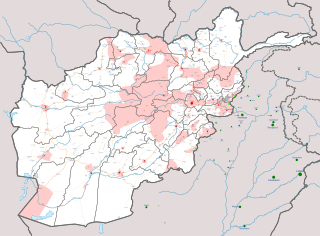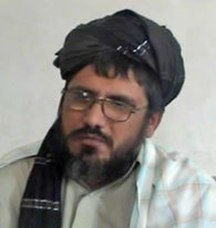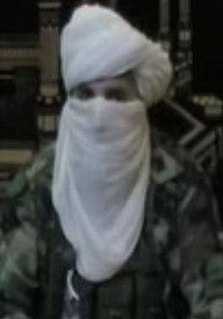
Mullah Mohammed Omar, widely known as Mullah Omar, was an Afghan mujahideen commander who founded the Islamic Emirate of Afghanistan in 1996. The Taliban recognized him as the Commander of the Faithful or the Supreme Leader of the Muslims until being succeeded by Mullah Akhtar Mansour in 2015. Some sources described Mullah Omar as "Head of the Supreme Council of Afghanistan". The Supreme Council was initially established at Kandahar in 1994.

Dalbandin (Balochi:دالبندین) is a city in District Chaghi, Balochistan,near the Iran and Afghanistan border. It has a population of 16319, and the remainder of the entire Dalbandin Tehsil has a population of 110503. It is located at an altitude of 843 m (2769 ft).Dalbandin is famous for fruit orchards and more. Dalbandin Airport is a small domestic airport located at city's centre. There are two weekly flights of Pakistan International Airlines to/from Karachi.

The Taliban insurgency began shortly after the group's fall from power following the 2001 War in Afghanistan. The Taliban forces are fighting against the Afghan government, formerly led by President Hamid Karzai, now led by President Ashraf Ghani, and against the US-led International Security Assistance Force (ISAF). The insurgency has spread to some degree over the Durand Line border to neighboring Pakistan, in particular the Waziristan region and Khyber Pakhtunkhwa. The Taliban conduct low-intensity warfare against Afghan National Security Forces and their NATO trainers. Regional countries, particularly Pakistan and Iran, are often accused of funding and supporting the insurgent groups.

Maulavi or Mullah Dadullah or Dadullah Akhund was the Taliban's senior military commander until he was killed by British and American special forces in Afghanistan in 2007. He was an ethnic Pashtun from the Kakar tribe of Kandahar province. According to the United Nations' list of entities belonging to or associated with the Al-Qaida organization, he had been the Taliban's Minister of Construction.

Sirajuddin Haqqani is a military leader hailing from Afghanistan, who as deputy leader of the Taliban oversees armed combat against American and coalition forces, reportedly from a base within North Waziristan in Pakistan, from which he provides shelter to Al Qaeda operatives. Sirajuddin Haqqani is the leader of the Haqqani network, a sub-set of the Taliban organisation, and scion of the Haqqani clan. Haqqani is currently deputy leader under the Taliban supreme commander, Mawlawi Haibatullah Akhundzada.

Mullah Mansoor Dadullah (1972–2015) was Mullah Dadullah's younger half-brother who succeeded him as a senior military commander of the Taliban in southern Afghanistan. He came from the Arghandab district of Kandahar province, and belonged to the Kakar Pashtun tribe.
Maulvi Saif-ur Mansur was a senior Taliban commander.

Maulvi Nazir was a leading militant of the Pakistani Taliban in South Waziristan. Nazir's operations were based in Wana.
See also: 2007 in Afghanistan, other events of 2008, 2009 in Afghanistan and Timeline of the War in Afghanistan (2001-14).

Mullah Muhammad Rasul is the leader of the High Council of Afghanistan Islamic Emirate, a Taliban group in Afghanistan. He was a Taliban-appointed governor of Nimruz Province, Afghanistan. Rasul exerted economic pressures on ethnic and religious minorities unpopular with the Taliban, and made a considerable fortune controlling cross-border drug-smuggling through Nimruz.
The Mullah Dadullah Front, also known as the Dadullah Front, the Mullah Dadullah Lang Allegiance or the Mullah Dadullah Mahaz, is an insurgent group in Afghanistan that has claimed responsibility for a series of bombings and assassinations centered in Kabul.
Jamaat-ul-Ahrar is a terrorist organization that split away from Tehrik-i-Taliban Pakistan in August 2014. The group came to prominence after it claimed responsibility for the 2014 Wagah border suicide attack. In October 2017, there were unconfirmed reports that Omar Khalid, the leader of the JuA, had died from injuries sustained in a US drone strike in Paktia Province, Afghanistan.
Sayyid Muhammad Tayyab Agha was the head of the political wing of the Taliban and a close aide to Mullah Omar. During the government of the Islamic Emirate of Afghanistan, he served as chief of staff to Mullah Omar, as well as his personal secretary, translator, and press spokesman. In addition to Pashto, he speaks English, Arabic, Urdu, and Persian. He was born in 1976 in Jelahor village, Arghandab District, Kandahar Province and belongs to a prominent religious family from the Sayyid tribe.

Mullah Akhtar Mohammad Mansour was the leader of the Taliban, an Islamic fundamentalist political movement in Afghanistan, from 29 July 2015 to 21 May 2016.

The Sacrifice Front, more commonly known as Fidai Mahaz, is a Taliban splinter group and faction in the War in Afghanistan. They are led by Mullah Najibullah, also known as Omar Khitab, a former Taliban commander.

Najibullah, often referred to as Mullah Najibullah or Hajji Najibullah, and also known by the pseudonym Omar Khitab, is the leader of the Taliban splinter group Fidai Mahaz in Afghanistan.

Mawlawi Hibatullah Akhundzada is the leader of the Taliban, an armed militant group that was the former government of Afghanistan.
Mullah Mohammad Yaqoob or Mullah Yaqoob is the eldest son of Mullah Mohammed Omar, the Afghan mujahideen commander, founder of the Taliban and the former Emir of the Islamic Emirate of Afghanistan. He was born in 1990.

On May 31, 2016, Taliban militants posing as government officials kidnapped around 220 civilians at a fake checkpoint along the Kunduz-Takhar highway near Arzaq Angor Bagh in Kunduz province, Afghanistan, on the outskirts of the city of Kunduz.
Usman Ghazi was the Emir of the Islamic Movement of Uzbekistan, an Islamic militant group based in Afghanistan and Pakistan. He succeeded Usman Aadil after the latter's death in a drone strike. His current whereabouts and condition are unknown after his group was defeated in fighting with the Taliban in Zabul province, though he is presumed dead. Lately the faction of the IMU remaining loyal to the IS leader of Khorasan, Hafiz Saeed Khan, confirmed the death of Ghazi and named a man called Abduholiq as their leader.
















